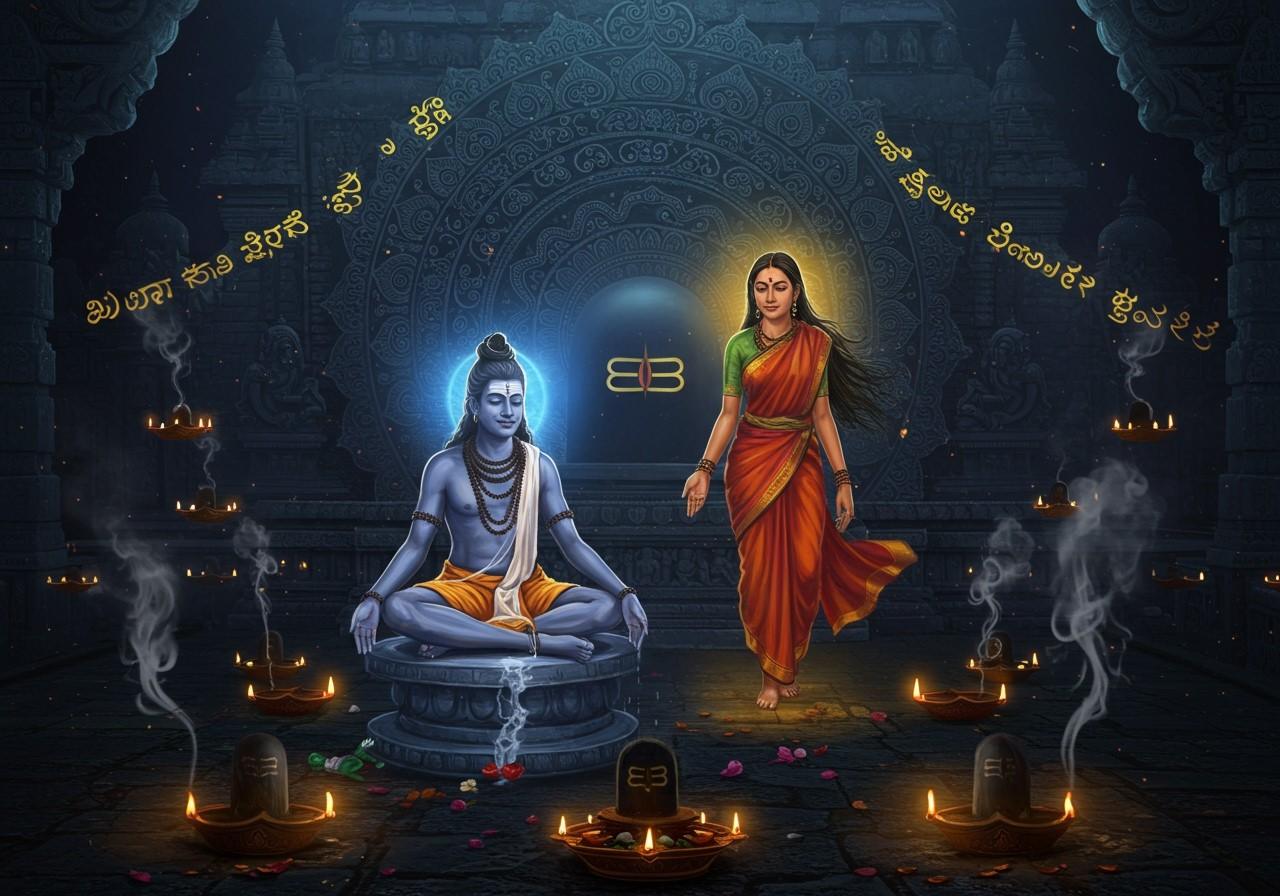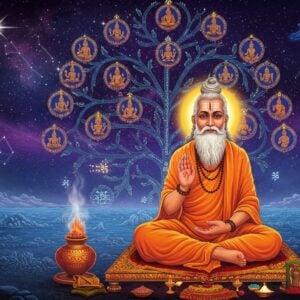Vachana Literature: A Profound Transformation

Vachana literature, a distinct form of Kannada poetry, arose during the 12th century as a component of the Veerashaiva movement. It ignited a spiritual awakening and championed social reform. “Vachana” translates to “words” or “sayings.” These poems are simple yet profound expressions of philosophical concepts, spiritual encounters, and social critiques.
Allama Prabhu: The Mystic Poet
Allama Prabhu is a central figure in Vachana literature. Renowned for his deep and mystical vachanas, he guided the Anubhava Mantapa, a gathering of saints and scholars. He advocated for monism and self-realization, prioritizing personal spiritual experience over rituals. His use of paradox and metaphor challenged conventional beliefs, inspiring generations of poets and thinkers.
Explore rituals and significance of deities at poojn.in.
Akkamahadevi: The Spiritual Icon
Akkamahadevi, another pioneer, is celebrated for her devotion to Lord Shiva. She defied societal expectations, embracing an ascetic life in her quest for spiritual truth. Her vachanas critique societal and gender inequalities through emotive imagery and personal expression. She remains a symbol of female empowerment and spiritual autonomy.
Early Pioneers of Vachana
Before Allama Prabhu and Akkamahadevi, figures like Devara Dasimayya (1015-1043 A.D.) and Madara Chennaiah (11th-century) laid the groundwork. Devara Dasimayya, recognized as “Adya Vachanakara” (the first Vachanakara), lived during the Kalyani Chalukyan era. Madara Chennaiah, often called the “father of Vachana poetry,” was a cobbler-saint. Their contributions paved the way for Vachana literature’s flourishing.
Basaveshwara: Central to the Movement
Basaveshwara, a pivotal figure in the Veerashaiva movement, played a crucial role in Vachana literature’s growth. His writings emphasized social equality and personal devotion, challenging the caste system and promoting unity. His influence extended beyond poetry, shaping social and religious practices.
Philosophical Roots
Vachana literature’s philosophical core is profound. It emphasizes ‘Anubhava,’ meaning direct personal experience of the divine, over rituals. Both Allama Prabhu and Akkamahadevi highlighted non-dualism, challenging orthodox views. Their teachings continue to inspire movements for spiritual awakening and social justice.
Cultural Impact
Vachana literature sparked a cultural revolution in 12th-century Karnataka. It questioned rigid caste structures and championed equality. Poets like Allama Prabhu and Akkamahadevi explored themes of love, devotion, and the rejection of materialism. This movement significantly influenced later Bhakti traditions across India.
Explore the impact of ancient Indian literature on art and culture at poojn.in.
Enduring Legacy
The legacy of Allama Prabhu, Akkamahadevi, and others remains vibrant today. Their works inspire contemporary poets and spiritual seekers. Ongoing efforts to preserve Vachana literature ensure its relevance for future generations. The teachings within these vachanas offer timeless wisdom for life and spirituality.
Vachana literature is more than just poetry; it is a profound expression of the human experience, offering guidance for personal and social transformation.
Poojn.in: Supporting Your Spiritual Journey
At Poojn.in, we provide authentic puja items to honor the spiritual legacy of Vachana poets. Our curated collection includes:
- Pure brass and copper diyas for meditation: Enhance your meditation practice with the warm glow of traditional diyas. Our diyas are crafted with high-quality materials for a pure and authentic experience.
- Natural incense sticks: Create a sacred atmosphere with our natural incense sticks, made with traditional ingredients. Their calming fragrances promote tranquility and focus during meditation.
- Cotton wicks for ritual lamps: Sustain the flame of your spiritual practice with our pure cotton wicks, specifically designed for ritual lamps. They ensure a clean and steady burn.
- Handcrafted prayer beads (japa malas): Deepen your connection to the divine with our handcrafted prayer beads. Each mala is carefully made to support your chanting and meditation practices.
- Pure copper water vessels: Honor sacred rituals with our pure copper water vessels, known for their traditional significance. Their purity enhances the sanctity of your practices.
- Meditation cushions and asanas: Find comfort and support during meditation with our cushions and asanas. Choose from a variety of options to enhance your posture and focus.
Find exquisite murtis for your spiritual practices at poojn.in.
Discover beautiful Laddu Gopal murtis at poojn.in
We deliver across India with secure packaging and tracking. Visit www.poojn.in for our full range. Product availability may vary.
Celebrating Timeless Influence
Vachana literature shines as a beacon of wisdom. Allama Prabhu and Akkamahadevi’s powerful words and unwavering spirit have left a timeless legacy. Their vachanas resonate with those seeking deeper truths.
These teachings guide us through life’s complexities, emphasizing personal spiritual experiences and the courage to question norms. Vachana literature bridges tradition and modernity, blending ancient wisdom with present possibilities.
By preserving this rich tradition, we ensure the voices of Allama Prabhu and Akkamahadevi continue to inspire. Their legacy encourages exploration, reflection, and growth, nurturing a deeper connection to our cultural roots and spiritual paths.
FAQs
Who were Allama Prabhu and Akkamahadevi? Allama Prabhu and Akkamahadevi were central figures in the 12th-century Vachana movement in Karnataka, known for their profound contributions to Vachana literature. They were poets, mystics, and social reformers who challenged traditional beliefs and championed spiritual equality. Their vachanas, simple yet profound poems, continue to inspire spiritual seekers today.
What is Vachana literature? Vachana literature is a unique form of Kannada poetry that flourished during the 12th century as part of the Veerashaiva movement. Characterized by its straightforward language and focus on personal experience, it served as a powerful tool for spiritual expression and social commentary. Vachanas often explore themes of devotion, social justice, and the search for truth.


